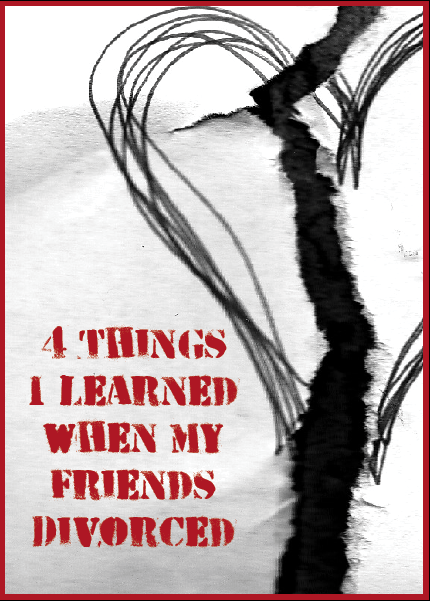4 Things I’ve Learned from My Friends’ Divorces by Ellie of Musing Momma


It is a sad and messy rite of passage into middle-age: Friends and acquaintances start to divorce. Lots of them. Or at least enough that I can write about it here without it being any one in particular. Some are friends whose weddings I attended or was even in. I witnessed the beginning and also the end, albeit from the outside. In the beginning, each couple was full of hope and love and excitement, certain that they were in it for the long haul. Of course. And then…
Sometimes a reason for the end is easy to pinpoint. There is a Big Thing – infidelity or abuse or constant conflict. But sometimes it seems to come out of nowhere, as a hundred little heartbreaks and disappointments pile one upon the other until it becomes unbearable. The end is so slow to work its way to the surface that it seems to come out of nowhere. Each time a couple we know splits up – a couple that seemed just fine – I look at my husband and think, That would never happen to us. And then, Could that happen to us? And then, Oh crap, how do I make sure that is never us?!
I find myself looking for the lessons, wanting to find the Thing that will protect my marriage. I’ve never been through a divorce myself, so I can speak only as a bystander. I am sure that the end of any marriage is usually the result of a maze of events and experiences, so that even when we say It was because of That, there is much more than That (whatever That is). But here is one of the things I am sure of: Communication is essential. Is that cliché? You’ve heard it before? Bear with me for a moment while I explain….
Speak up.
Those little heartbreaks that happen in a marriage, the ones we brush aside and try to forget about because life is busy and stressful enough and sometimes it is easier not to bother or because we aren’t sure where to begin? We need to acknowledge them and put them on the table. As insignificant as they might seem, they have a way of adding up.
And when we do speak up, we owe it to our partners to let them know what is at stake – especially if doubts are setting in. “I really wish we went out on the weekends once in a while” is not the same as, “The fact we don’t go out and do things together is a big problem for me. I hate sitting at home all weekend. I’m not happy with this. I am unhappy in our marriage. I don’t know if I can live like this for the rest of my life. ” We all have grievances in our relationships, some that we can overlook and others that fester and take their toll. Our partners deserve to know which is which.
Hear your partner. Then, show that you heard.
When our partners tell us something is bothering them or let us know what they need to be happy, we need to listen. No, we need to do more than listen – we need to really hear them. We need to take what they are saying into consideration and think about what we can do to make things better, instead of blowing it off. If our partners tell us what they need (or share a frustration or hurt) and we don’t show that we’ve heard them, they will eventually start to feel invisible or resentful, neither of which makes for a happy marriage.
I thought about this when I listened to our Editor-in-Chief, Val Curtis, interview Kristin Shaw from Two Cannoli on BonBon Break Live last month. (Awesome interview, by the way. Definitely check it out.) They talked about the concept of showing love, rather than just saying the words. Taking our partner’s complaints seriously instead of blowing them off is an act of love, even if the request seems small. Or, as Kristin said at one point, “Love is paying attention.”
This is something my husband does really well. When I share something that bothers me, he may not give me the reaction I want at that very moment, but he always comes back to it later and does something that shows me that he heard me and that what I need matters to him. This says “I love you” more than any words can.
Share honestly.
A couple of years ago I wrote a post about how friends can help a marriage. I had gone to dinner with my best girlfriends and we got to talking about our relationships. We all had young kids at home, so the general theme was something along the lines of “He’s a great dad – I just wish there was more time and attention left over for me.” I remember that conversation being so reassuring.
It is easy to be fooled into believing everyone else has it together when it comes to their relationships, but the truth is that we all (or at least most of us) have ups and downs. We have periods of feeling so close to our partners and periods of feeling so far apart. Times of intense attraction and times of don’t-bother-me. Times of being best friends and times of serious conflict. If we think we are the only ones experiencing these waves, and everyone else’s marriages are something out of a romantic comedy, of course we are going to feel cheated and dissatisfied.
Hearing a friend say, “That happens to us, too!” or “I feel that way sometimes,” normalizes our experience and puts it in perspective. It helps line up our expectations with the reality of marriage. Sometimes friends help us come up with new solutions or fresh insights. Or, when things are way out of whack, a close friend may be just the one to help us pull our heads out of the sand and give us the courage to face what is happening.
Don’t roll your eyes.
Okay, I admit I didn’t learn this one from my friends. I have no idea if any of them are eye-rollers. This comes from research done by Dr. John Gottman, who has studied marriage for years and identified communication patterns that predict divorce with a pretty amazing level of accuracy. The big ones he calls “The Four Horseman of the Apocalypse”: #1, Criticizing your partner’s personality or character. #2, Contempt. #3, Defensiveness. #4, Withdrawing. In short, it’s a good idea to communicate more like the Duggars and less like the Gosselins. (I try not to call anyone out on-line – public figures included – but these are fabulously perfect examples.)
Lucky for me, my husband is well-versed in Gottman’s research (which is what I get for marrying someone who teaches psychology for a living) so if I ever roll my eyes he points out that it’s a sign of contempt. Eek! No more eye-rolling here!
Like I said, I have only been a bystander. Maybe my lessons-learned are simplistic or naïve, but they have proven valuable to me nonetheless. And while I am sure these things alone aren’t sufficient to keep a marriage going, maybe they are necessary for a really healthy relationship.
What do you think are the keys to a healthy marriage? If you’ve been through a divorce, what do you think – are these important lessons? What would you add?

ABOUT ELLIE: Ellie is the editor of the Family Room at BonBon Break and blogs at Musing Momma, where she shares honest and personal stories ranging from reflections on motherhood to tips for raising healthy and (relatively) well-behaved kids, and from research on child development to fun family activities. As wife and mother in a multiracial family, she often writes about the intersection of race and family, and her experience raising two African-American/white sons. Ellie has a Ph.D. in psychology and counseled children and families for several years before changing paths to spend more time with her family. She resides in central Pennsylvania with her husband and their two adorably mischievous boys, ages 4 and 7.
Follow Ellie on Facebook | Twitter | Google+ | Pinterest. You can subscribe to her blog here.
CONTINUE READING IN THE FAMILY ROOM
![]()





